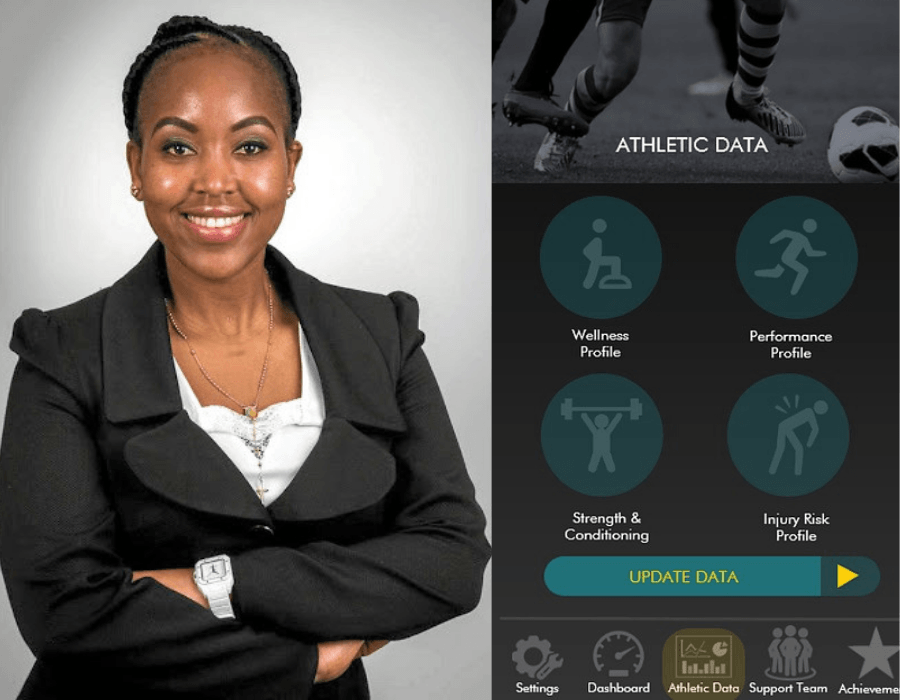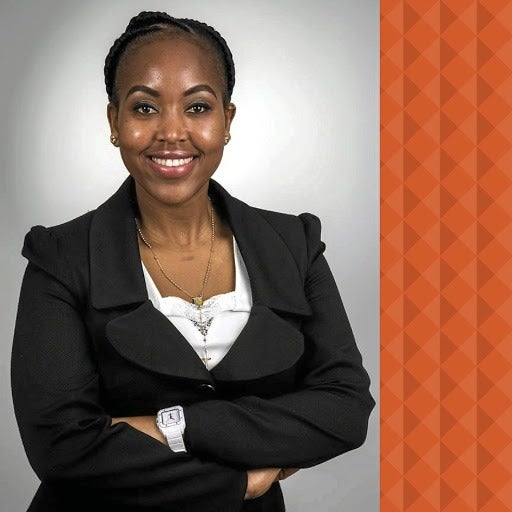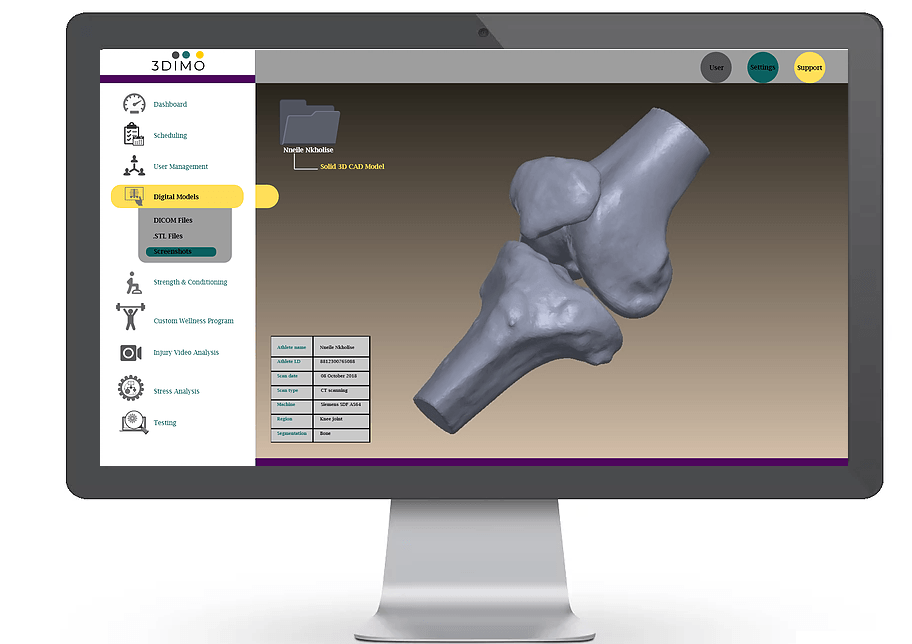
Rather than simply reacting to a costly and debilitating sports injury, sports data science company 3DIMO is aiming to prevent the problem occurring in the first place.
Issues such as torn ligaments, ruptured spleens, dislocated joints and broken vertebrae are all injuries that can lead to long-term or career-threatening scenarios.
They can also cost large amounts of money to treat with the return from injury sometimes a lengthy and difficult process.
West Ham and England midfielder Jack Wilshere admitted he considered quitting football after suffering ankle surgery complications.
New sports data science company, 3DIMO, could help make such long-term injuries a thing of the past.
Founded by mechanical engineer Nneile Nkholise in 2018, it uses an athlete’s specific bio-mechanical data to predict, analyse and prevent sport-related injuries.
Nkholise explained: “The benefit of detecting injury risks helps athletes be more informed about the activities happening in their bodies, and when they’re more informed about their bodies they’re able to make smart decisions during the game model for them to perform their best and avoid injuries.
“We have noticed that athletes are so determined to be the best and over-train without even noticing that they are over-training, this results in athletes exerting excessive loading on their joint, which is how injuries occur and their performance drops.
“Our product will help guide them to know when it’s enough and to stop.”

3DIMO’s process to achieve data
According to information site WorldAtlas, football is the biggest sport in the world, with 4 billion fans — almost two times larger than the second-largest game, cricket.
In 2001, UEFA initiated the Elite Club Injury Study, a research programme looking into injury in the game.
While this study looked at why injuries happen, the 3DIMO software aims to forecast the possibility of injuries occurring.
This gives team managers the information they need to alter players’ training routines and keep them fit using athlete-specific biomechanical data.
Nkholise, who was listed 13th by Forbes Africa on the 30-under-30 technology list, says: “3DIMO is a sport lab where we primarily focus on football and offer solutions on injury prevention and performance optimisation.
“This is achieved through our team’s expertise in performance data analytics where we use performance tracking devices and stress sensing wearable’s to capture data of players during training or at games.”
“It will help to accelerate the treatment of injuries to athletes thereby boosting their fitness and reducing the recurring costs which their clubs and management incur in taking them to the treatment table.”
The Johannesburg-based company believes using mathematical modelling is an efficient way to achieve the most accurate data.
“Coming from a technology background, my biggest hurdle was transitioning into an entrepreneur,” Nkholise explains.
“The finance jargon used to torment me, but data is a lot of numbers and in sports there are millions of numbers being generated.
“When we use mathematical modelling — it allows for filtering of data using AI because data can be anything.
“It also helps in strengthening the accuracy of results being provided post data analytics.”
This process helps the 3DIMO team create digital 3D models of an athlete to use as a reference for comparison in preparation for when they encounter an injury — or even the possibility of one.

models (Credit: 3DIMO)
Being a woman entrepreneur in South Africa
As one of the few women in the industry, Nkholise says she didn’t have anyone as a reference in business.
In 2015, she founded biotech start-up iMed Tech to develop affordable prosthesis for cancer patients and burn victims, for which she received funding after winning the SAB Foundation social innovation award.
Despite surgically placed 3D printed breast implants being available, iMed Tech’s range of 3D printed external breast prostheses provided a range of skin tones for mastectomy patients and received a patent for a “breast prostheses retention bar.”
By starting iMed Tech, she also wanted to represent and show women have the power and potential to run businesses within the medical technology sector.
“And not just ordinary businesses, but ones that will go on to become global conglomerates,” adds Nneile.
“The 3DIMO company was born from the lessons and experiences I had in iMed Tech where we used to do custom prosthesis and surgical planning models.
“I learned that many of the injuries that people experienced were soft-tissue and the main causes were things such as undetected excessive stress and strain, which in the long run leads to muscle fatigue, over-training, poor nutritional plan and fatigue or lack of rest.
“I noticed that athletes were the ones who are hit hard by injuries a lot more as their careers depend on them being fully fit at all times.”
Why 3DIMO is unique to other sport tech
Athletes are aware the prospect of an injury is very real each time they perform, with increasing numbers using technology to improve injury prevention and recovery.
Strenuous physical activity during sports puts their bodies through extraordinary stresses, putting them at a much greater risk of concussions, tendon injuries and shin splits.

The global sports medicine market is anticipated to grow to $8.3bn by 2019, due to technological development for joint repair implants and demand for minimally invasive procedures.
But Nkholise says, unlike her product, a lot of devices in the market have a blanket approach to performance.
She says: “We have made our product more personalised and ensure that every product is unique for every person.
“This is why before using our product, we recommend the athlete visits one of our performance coaches for full testing for a deep understanding of your allowable load at the joints and also your performance targets.”
The company has been running product tests for the past two months — and will continue to run them until the end of October to fully strengthen their business case and product reliability.
Nkholise says: “At the moment we have run 12 proof of concept and have achieved a product efficiency of 94% but are aiming to get the efficiency up to 98%, because in statistics hypothesis testing, it is always advised to get the lowest margin of error as possible, and 2% is what we have allowed for ourselves.”
Last month, the company was selected as one of the 22 start-ups from ten countries to take part in the Cape Town-based start-up boot camp AfriTech accelerator.
The tech accelerator said it had received 1804 applications from 64 countries for its 2019 cohort, an 80% increase on last year’s 1004 applications from over 77 countries.
The top ten will be welcomed into the accelerator programme, which starts this month and will provide the opportunity to attend masterclasses, collaborate with corporate partners, run pilots and proof-of-concepts in order to scale their companies.






